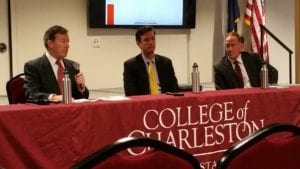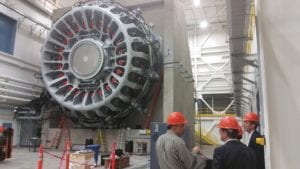
ASP Climate Security Trip to Charleston, South Carolina
On November 9th and 10th, 2015 representatives of the American Security Project visited Charleston, South Carolina. Attending were Lieutenant General Norm Seip, USAF (Ret.) and Brigadier General Stephen A. Cheney, USMC (Ret.). Cheney is the CEO of the American Security Project, and a 30 year veteran of the Marine Corps. Seip is a member of ASP’s board, and served in the Air Force for more than three decades, with combat patrols over Iraq. Andrew Holland and Porter Brockway, ASP’s events manager, rounded out the delegation.
The first meeting was with Carolee Williams, the director of the Planning, Preservation & Sustainability Office in the office of the Mayor of Charleston. The meeting was held under Chatham House Rules, but they discussed threats to the region from climate change, particularly sea level rise – and had an animated discussion about the politics of climate change in the South.
 The first public discussion on the tour was at the College of Charleston, where Generals Cheney and Seip spoke to a crowd of about 50 faculty, students, and local residents. Their speech started with General Cheney laying out the facts about climate change in a presentation and drawing upon personal stories to relate this to the audience. Then General Seip discussed how climate change is going to change the operating environment for the military, and continued to discuss some of the threats stated by Cheney. The event was organized by Dr. Brian Fisher, Associate Professor and Sustainability Director.
The first public discussion on the tour was at the College of Charleston, where Generals Cheney and Seip spoke to a crowd of about 50 faculty, students, and local residents. Their speech started with General Cheney laying out the facts about climate change in a presentation and drawing upon personal stories to relate this to the audience. Then General Seip discussed how climate change is going to change the operating environment for the military, and continued to discuss some of the threats stated by Cheney. The event was organized by Dr. Brian Fisher, Associate Professor and Sustainability Director.

The following day, ASP delegation visited the SCE & G Energy Innovation Center, an initiative of Clemson University in Charleston. This facility houses the largest and most-advanced wind-turbine drivetrain testing facility in the world. It also holds the Electrical Grid Research Innovation and Development project, which can simulate the electrical grid of any country in the world, in order to better understand the threats and vulnerabilities of the grid.
The afternoon was spent in an editorial board meeting with the Charleston Post & Courier, who then wrote an article, “Cutting into carbon; everyday actions can help stem warming, sea rise” about it.






